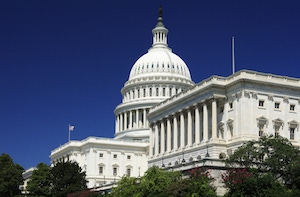House ag leaders call for sheep, lamb inclusion in CFAP
USDA urged to assist U.S. lamb and sheep producers affected by economic fallout of coronavirus pandemic.

In a letter to Agriculture Secretary Sonny Perdue on Aug. 5, House agriculture livestock and foreign agriculture subcommittee chairman Jim Costa (D., Cal.) and ranking member David Rouzer (R., N.C.), joined by House Agriculture Committee chairman Collin Peterson (D., Minn.), ranking member Michael Conaway (R., Texas) and 17 other members, urged the U.S. Department of Agriculture to assist U.S. lamb and sheep producers affected by the economic fallout of the coronavirus pandemic.
The letter follows closure of the nation’s second-largest lamb processor, representing an estimated 20% of the nation’s processing capacity, and pushes USDA to help lamb and sheep farmers and ranchers find alternate processing and marketing options immediately.
“This closure … comes at a time when the sheep industry was already forecast to lose more than $350 million due to COVID-19-related market declines, and feedlots are already at peak capacity in many places,” the lawmakers wrote in the letter. “We must do everything we can to support the families who make up the sheep industry in our states as they whether these significant and pressing challenges.”
Chase Adams, senior policy and information director for the American Sheep Industry Assn., said when many foodservice establishments closed in mid-March, it resulted in a $125 million industry loss at the farm gate and an estimated $350 over the course of the COVID-19 pandemic. Essentially, a 40% dip came in mid-March, when there were a tremendous number of lambs in feedlots for the Easter season.
“This pandemic continues to take a disproportionate toll on farmers and ranchers, and the impacts that even one processor closing has on the ability of lamb and sheep producers to get by in these tough times is something we can and should remedy,” Costa said. “USDA has the ability to aid these producers in finding other options for marketing and processing in a way that keeps these products flowing through the supply chain and helps farm families get through this rough patch.”
Rouzer added, “As we’ve seen throughout the COVID-19 pandemic, decreases in processing capacity have greatly impacted the entire livestock industry, and this closure will be no different. The economic impacts that America’s sheep raisers will feel as a result are yet another struggle they will have to overcome during an already trying time. It is imperative that we continue to explore all options to preserve and expand processing capacity for the lamb and sheep sector.”
“The loss of processing capacity has only magnified the struggles and challenges facing lamb and sheep producers across the U.S.,” Peterson said. “We hope that Secretary Perdue will move quickly to address this pressing need and aid these producers in identifying and establishing more alternative processing options for U.S. lamb producers in both the short and long terms.”
“The closure of the second-largest lamb and sheep processing facility in the country will have a ripple effect felt throughout the entire market. As America’s farmers and ranchers continue to feel the strain caused by COVID-19, it’s critical that we provide support to help them through this difficult period,” Conaway said.
Adams said he’s optimistic that USDA will include additional assistance for lamb and sheep producers. “Until foodservice comes back in a meaningful way, those funds are not going to take the place of losses, but it will help,” he added.
About the Author(s)
You May Also Like





